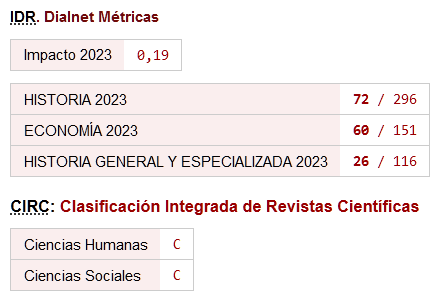‘Systems of values’, ‘ethical systems’, and sustainability. The economic social ‘entity’ values
DOI :
https://doi.org/10.26784/issn.1886-1881.v18i1.427Mots-clés :
Systems of values, Ethical systems, Anthropological analysis, Scientific methods, Economia aziendale, Neoclassic economics, Sustainable management, Social welfareRésumé
The paper aimsto explore the relationships between ‘ethical systems’ and ‘systems of values’, offering
also semantic and epistemological issues from which ethics cannot be divorced. Although ethics is a branch of
philosophy that has its roots in ancient Greece, it experienced a remarkable revival in recent decades not only in
philosophy but also in the social and applied sciences. And this deserves wider recognition and appreciation. A
considerable amount of ethical thinking can be found in the current and previous literature of economia
aziendale, entity economics, general economics, management, and social philosophy. Ethical principles are
coextensive with principles of rational behavior and all ethics are contextual in the sense that surrounding
circumstances, environmental conditions and situations are involved.
The reference to science and mathematics for ethical arguments partially depends on methodology based on a
postulated outside ‘natural world’ with statistical relative uniformities. Behavioral economists and management
scientists prefer, as primitive foundations, scientific methods with their observations and prediction of economic
and sociological relative regularities. The ‘received view’ that language itself conditions all aspects of reality
includes now the topic that persuasion and rational arguments can support ‘ethical systems’.
Realization of common welfare is a prerequisite for establishing a ‘master values system’ and for meeting the
‘specifics’ which compose ethical principles. The historical research and anthropological analysis are necessary
for constructing suitable ‘system of values’ for every entity, economic and not.
The coordination of specific ‘systems of values’ and directives is a necessary condition for social welfare.
Consequently, any society must compose every kind of conflicting ‘values systems’ and ends into a coherent
framework. Neoclassic economics traditionally neglected ‘environmental and social issues’. Different variations
of environmental ethics have been developed; beyond many questions, there are the issues of cause and remedy
of the global as well as local ecological crisis. To-day, in times of crisis and pandemia the market paradigm is
exhausted, it does not meet the ‘ethics of reciprocity’. In socialist economics exchanging goods at their ‘socially
necessary labor cost’ would operate as a satisfactory surrogate. Also, entity economics does not completely
escape the labor value identification of classical economics.
Téléchargements
Références
Amaduzzi, A. (1978) L'azienda nel suo sistema e nei suoi principi, Turin: Utet (first ed.1953).
Argandona, A. (1998) 'The stakeholder theory and the common good', Journal of Business Ethics 17:1093-1102. https://doi.org/10.1023/A:1006075517423
Azzini, L. (1982) Istituzioni di economia d'azienda, Milan: Giuffrè Editore (first ed. 1978).
Becchetti L., Bruni, L. Zamagni, S. (2020) The microeconomics of wellbeing and sustainability: recasting the economics, Turin: Giappichelli Editore (first ed. 2019). https://doi.org/10.1016/B978-0-12-816027-5.00001-X
Bentham, J. (1789) Introduction to the principles of morals and legislation (reprinted, New York:Hafner, 1948) https://doi.org/10.1093/oseo/instance.00077240
Bruni, L. (2012) The genesis and ethos of the market, London: Palgrave Macmillan. https://doi.org/10.1057/9781137030528
Bruni, L. (2019) The economy of salvation. Ethical and anthropological foundations of market relations in the first two books of the bible, New York: Springer Publishing Co. https://doi.org/10.1007/978-3-030-04082-6
Bruni, L. and Smerilli, A. (2014) The economics of values-based organizations. An introduction, London: Routledge. https://doi.org/10.4324/9781315780801
Bunge, M. (1989) Treatise on basic philosophy, vol. 8, Ethics: the good and the right, Dordrecht-Holland: D. Reidel. https://doi.org/10.1007/978-94-009-2601-1
Caselli, L. (2020) 'L'etica non è un di più', Impresa Progetto. Electronic Journal of Management 3:1-4.
Chambers, R. J. (1966) Accounting, evaluation and economic behavior, Englewood Cliffs: Prentice Hall.
Coda, V. (2020a) 'Responsabilità degli amministratori e funzionalità dell'impresa: profili economico-aziendali', Rivista dei Dottori Commercialisti LXXI, 3, 2020 (July-September): 399-411.
Coda, V. (2020b) 'Lo scopo dell'impresa', Impresa Progetto. Electronic Journal of Management' 3, 2020: 1-26.
Costa, E. and Ramus, T. (2012) 'The Italian economia aziendale and catholic social teaching: how to apply the common good principle at the managerial level', Journal of Business Ethics 106:103-116. https://doi.org/10.1007/s10551-011-1056-x
Devine, C. T. (1985) Essays in accounting theory, Sarasota: American Accounting Association.
Devine, C: T. (1999) Essays in accounting theory. A capstone (edited with a preface and notes by H. S. Hendrickson), New York and London: Garland Publishing.
Ferrando, P. M. (2020) ' I fini e la natura dell'impresa: una frontiera in divenire', Impresa progetto. Electronic Journal of Management 3: 1-15. https://doi.org/10.15167/1824-3576/IPEJM2020.3.1331
Ferrero, G. (1968) Istituzioni di economia d'azienda, Milan: Giuffrè Editore.
Freeman, E. et alii (2010) Stakeholder theory: the state of the art, Cambridge, U. K.: Cambridge University Press. https://doi.org/10.1080/19416520.2010.495581
Galassi , G. (1969) Concentrazione e cooperazione Interaziendale, Milan: Giuffrè.
Galassi, G. (2017) 'Reddito e momento di formazione dei valori. Contributo al dibattito sul D. Lgs. 139/2015 e sui nuovi principi OIC, Rivista Italiana di Ragioneria e di Economia Aziendale 5-8: 172-181.
Galassi, G. (2019) 'Epistemological aspects of the economic control', De Computis. Spanish Journal of Accounting History 16 (1): 31-48. https://doi.org/10.26784/issn.1886-1881.v16i1.343
Galassi, G. (2020) 'Economic income, historical costing income and conservatism. An integrated approach', De Computis. Spanish Journal of Accounting History 17 (2), December: 28-42. https://doi.org/10.26784/issn.1886-1881.v17i2.395
Galli, D. Torelli, R., Tibiletti, V. (2020) 'Shooting off a purpose: the adoption of the Benefit Corporation model as a signal', paper presented at the national congress (virtual meeting) of SIDREA, Società Italiana di Ragioneria e di Economia Aziendale (17 November): 1-28.
Hartwick, J. M. (2020) Advanced introduction to national accounting, Cheltenham, U. K.: Edward Elgar Pub.
Hendrickson, H. S, and Williams, P. F. (2004), eds., Accounting theory. Essays by Carl Thomas Devine, London and New York: Routledge.
Kant, E. (1788) Kritik der praktischen vernunft (translated and with introduction by L. W. Beck as Critique of practical reason, Indianapolis, IN: Bobbs-Merril). https://doi.org/10.1524/9783050056180
Kant, E. ([1797]1993) Metaphysik der ethic (translated by James W.Ellington as Grounding for the metaphisics of Morals, 3rd edn., Indianapolis, IN: Hackett, 1993).
Kauffman, S. A. (2008) Reinventing the sacred. A new view of science, reason and religion, New York: Basic Books. DOI:10.1162/artl.2009.
Ma, L., Zhang, M., Gao, J. and Ye, T. (2020) 'The effect of religion on accounting conservatism', European Accounting Review 29 (2): 383-407. https://doi.org/10.1080/09638180.2019.1600421
Marchini, P. L., Fellegara, A. M., Tibiletti, V. Mazza, T. (2020) 'Choosing the social goal for stakeholders: the adoption of the Benefit Corporation model in Italy', paper presented at the national congress (virtual meeting) of SIDREA, Società Italiana di Ragioneria e di Economia Aziendale (27, November): 1-30.
Masini, C. (1958) Economia delle imprese industriali e rilevazioni d'azienda, Milan: Giuffrè Editore (1st ed.1946).
Masini, C. (1960) L'organizzazione del lavoro nell'impresa, Milan: Giuffrè Editore (1st ed. 1956).
Masini, C. (1961) I rendimenti e i costi nelle determinazioni d'impresa Milan: Giuffrè Editore.
Masini, C. (1964) La struttura dell'impresa, Milan: Giuffrè Editore.
Masini, C. (1979) Lavoro e risparmio. Economia d'azienda, Turin: Utet (1st ed. 1968).
Mattessich, R. (1978) Instrumental reasoning and systems methodology. An epistemology of the applied and social sciences, Dordrecht: Holland/Boston: USA: R. Reidel Pub. Company. https://doi.org/10.1007/978-94-010-9431-3
Mattessich, R. (1995) Critique of accounting. Examination of the foundations and normative structure of an applied discipline, Westport, CTC: Quorum Books.
Mattessich, R. (2014) Reality and accounting. Ontological explorations in the economic and social sciences, London and New York: Routledge. https://doi.org/10.4324/9780203798737
Mattessich, R. (2015) 'Foundational research in accounting: professional memoirs and beyond - 2015 Revision and Extension of the De Computis Edition (of 2006), De Computis. Spanish Journal of Accounting History, June. https://doi.org/10.26784/issn.1886-1881.v12i22.290
Mattessich, R. and Galassi, G. (2015) 'On the interdependence of basic concepts: substance and space, time and change, and consciousness', Process Studies Supplement 20:1-17.
Mattessich, R. and Galassi, G. (2016) 'Speculative science ("Fairy Tale Science") in physics, cosmology, and economics' De Computis. Spanish Journal of Accounting History 25: 20-34. https://doi.org/10.26784/issn.1886-1881.v13i25.251
Onida, P. (1960) La logica e il sistema delle rilevazioni quantitative d'azienda, Milan: Giuffrè Editore.
Onida, P. (1963) Economia d'azienda, Turin: Utet (1st. ed. 1960).
Pope Francis (2020) Fratelli Tutti. On Brotherhood and Social Friendship. Retrieved December 15, 2020, from https://www.papalencyclical.net
Popper, K. R. (1966) The open society and its enemies, vols. two, fifth edition (revised), Princeton, N. J.: Princeton University Press.
Rorty, R. (1989) Contingency, irony, and solidarity, Cambridge, UK: Cambridge University Press. https://doi.org/10.1017/CBO9780511804397
Rusconi, G. (2019) 'Ethical firm system and stakeholder management theories: a possible convergence', European Management Review 16: 147-66. https://doi.org/10.1111/emre.12162
Saraceno, P. (1978) La produzione industriale, Venice: Libreria Universitaria Editrice (9th edn.).
Schweizer, M. and Galassi, G. (2012) 'German and Italian contributions to business ethics', Contabilità e Cultura Aziendale 12 (1) Spring-Summer: 61-95.
Searle, J. R. (1995) The construction of social reality, New York: Free Press.
Searle, J. R. (2004) Mind. A brief introduction, Oxford: Oxford University Press.
Sen, A. (1987) On ethics and economics, Oxford, UK/Cambridge, Mass.: Blackwell Publishing.
Sen, A. (2009) The idea of justice, Cambridge, Mass.: Harvard University Press.
Signori, S. and Rusconi, G. (2009) 'Ethical thinking in traditional Italian Economia Aziendale and the stakeholder management theory: the search for possible imteractions', Journal of Business Ethics 89: 303-318.
Stanford Encyclopedia of Philosophy (first published June 1, 2006; substantive revision May 30, 2018) 'Moral naturalism': http://plato.stanford.edu/entries/naturalism - moral/.
Stout, L. A. (2019) Citizen capitalism: how a universal fund can provide influence and income to all, San Francisco: Berret-Koehler Publishers.
Swartz, N. (2009, updated 20 February) 'Laws of Nature', Internet Encyclopedia of Philosophy: www.iep.utm.edu/lawofnat/.
Tettamanzi, D. (2009) 'Persona, etica, dono, speranza: parole per un'altra economia, amica dell'uomo', Intervention at the Seminar Caritas in Veritate. Un'altra economia è davvero possibile?, Milan: Bocconi University, November 3, 2009.
Tinker, A. M. (1985) Paper prophets. A social critique of accounting, New York: Praeger.
Tinker, A. M., Merino, B. D. (1982) 'The normative origins of positive theory. Ideology and accounting thought', Accounting, Organizations and Society 7 (2): 167-200. https://doi.org/10.1016/0361-3682(82)90019-8
Turker, D. (2020) Managing social responsibility. Functional strategies, decisions and practices, New York: Springer.
Wikipedia 'Cultural Relativism': http:// en,wikipedia.org/wiki/Talk%3Acultural relativism.
Wittgenstein, L. von (1961/1922) Tractatus logico-philosophicus, London: Routledge and Kegan Paul.
Zappa, G. (1956-1957) Le produzioni nell'economia delle imprese, tomes I, II, III (tome I published in 1956; tomes II and III published in 1957), Milan: Giuffrè Editore.
Zappa, G. (1962) L'economia delle aziende di consumo (posthumous), Milan: Giuffrè Editore.
Téléchargements
Publiée
Comment citer
Numéro
Rubrique
Licence

Ce travail est disponible sous licence Creative Commons Attribution - Pas d’Utilisation Commerciale - Partage dans les Mêmes Conditions 4.0 International.










